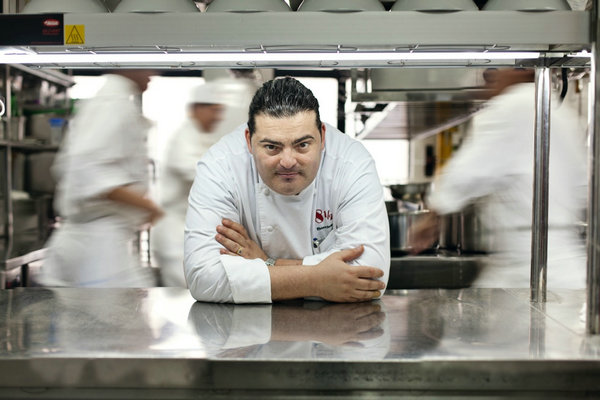What makes a restaurant great?
 |
|
Italian chef Riccardo La Perna at Otto e Mezzo Shanghai, which just claimed two stars.[Photo/China Daily] |
"Farmer Jacques may have a fabulous pig stand on the side of the road in Provence, but is his pate going to be noticed by Michelin?" groused one Hong Kong foodie in a blog last year. "I don't think so."
Such issues reflect particular challenges for Michelin in Asia, such as who is doing the judging and who is the target reader of the guides?
"I would argue that Dianping.com is a better judge than Michelin," says one Shanghai chef. "At least it reflects the opinions of the Chinese people." But do people buy a Michelin guide to get the opinions of local diners? asks another chef.
A more subtle question is how innovation and tradition are respectively rewarded in China and in the West. "If you are one of the Nordic restaurants that's all the rage, Michelin judges worship you for being the first to distill the essence of a grasshopper on a plate," says a Hong Kong food blogger. "But in China, they get excited by the prettiest food that can be traced directly to a long-ago emperor's table."
While Michelin works hard to shield the identities of its food inspectors, a company executive recently disclosed that most of the inspectors for the Shanghai guide are Chinese. However, only one of them is a Shanghai native. Many Shanghainese have carped that the Chinese restaurants honored serve Cantonese cuisine, not the best-known dishes of Shanghai.
In an online article headlined "5 myths about the Michelin Guide debunked", Michelin's Yong insists that the inspectors have a broad world view. Specifically, she says, a general assumption that the guide is biased toward French food is just not so.
"The Michelin Guide has a stable of inspectors who are full-time employees, who are responsible for rating over 40,000 hotels and restaurants in over 24 countries across three continents. Many of them have studied in the best hospitality schools in the world, live in different continents and have an open mind towards cuisines from every culture."
Addressing another myth, Yong notes that restaurants do not-and cannot-pay to be listed in the guide.
"The guide can't be the same the world over as the world is not the same," says a Western chef who recently left the China restaurant scene after a decade in mainland restaurants.
"I don't understand why people are not just happy for the restaurants that won awards."
Contact the writer at michaelpeters@chinadaily.com.cn
















